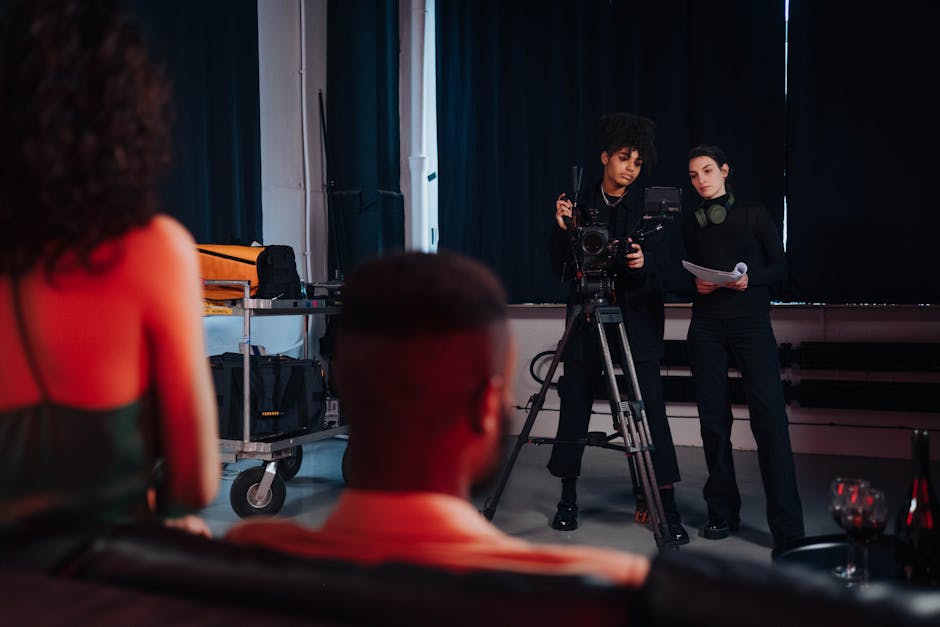The Origin of Reality TV
Reality TV, a popular worldwide phenomenon, had surprisingly humble beginnings. The idea of unscripted entertainment, in the form of reality television, was first birthed during the very early days of television itself.
Though some may argue its inspiration drawn from radio shows like 'Candid Microphone', the reality TV we recognizable today truly found its roots in the 1970s. A key stint was An American Family, broadcast on PBS, which documented the personal life of the Loud family. This real-life exposure of an ordinary family living an ordinary life was an extraordinary concept for the television viewers of that time.
Thus, reality TV as we know it began, transforming from a passive form of entertainment into an active, engaging, and controversial genre. The evolution of reality TV set the stage for a new era of televised programming, one that we continually experience to this day.
Historical Roots of Reality Television

Photo by Karolina Grabowska on Pexels
The roots of reality television can be traced back to the 1940s. Radio shows first attempted to capture this genre through programs like 'Candid Microphone' where unsuspecting individuals found themselves part of the show. Over subsequent years, the genre slowly morphed to accommodate elements of unscripted drama. It was in the 1970s that the first true reality show, 'An American Family', aired on PBS. This groundbreaking series documented the real-life drama of the Loud family, setting the framework for future reality shows.
By the 1990s, reality TV came into its own with the mega-popular MTV series 'The Real World', which showcased ordinary people living together in one home. This marked the birth of a new era, setting the course for the reality TV shows we've come to love and loathe today.
The Pioneers: Early Reality TV Shows

Photo by Bruno Massao on Pexels
The epoch of reality TV was hailed by the pioneers, laying the foundation for this entertainment genre anew. Their bold ingenuity led to the conception of pioneering shows like Candid Camera, which debuted in 1948. Unbeknownst to some, it was this show that started 'reality' before it even became a genre per se.
Fast forward to 1973, PBS broadcast An American Family, publicly recognized as the first reality series. The show permeated the boundary between public and private, venturing into the personal lives of the Loud family.
MTV's Real World and Survivor by CBS, further transformed this genre, mesmerizing viewers with their novel approach. These pioneers deserve credit for shaping reality TV's landscape, paving the path for today's plethora of reality programming.
Evolution: From Game Shows to Life on Screen

Photo by Tim Mossholder on Pexels
Reality television as we know it today has roots in past forms of broadcast entertainment. Traditional game shows were its initial precursors, providing nuggets of real-life dramas peppered with suspense, risks, and rewards.
Moving beyond trivia and physical challenges, producers sought to capitalize on audiences craving suspenseful, unscripted moments featuring everyday people. This led to the creation of reality game shows like "Survivor" and "Big Brother," where ordinary people were thrust into extraordinary circumstances.
The turn of the millennium brought a new brand of reality TV. This content highlighted everyday life, rather than constructed scenarios. Enter "The Osbournes" and "Jon & Kate Plus 8," captivating audiences with their voyeuristic peek into the mundanity of others' lives. This evolution, then, transformed the perception of reality TV, morphing from game-centered episodes to a window into the intriguing ordinariness of human life.
The Reality Boom: Survivor’s Impact

The dawn of the new millennium saw an unprecedented surge in the popularity of reality TV, largely thanks to Survivor. This innovative show, first aired in 2000, challenged the norms of television content by pitting real people against each other in a remote location.
The harsh yet picturesque backdrop created an immersive viewing experience, while the unscripted drama tapped into our primal instincts; survival, competition, alliances, and betrayal. Not only did Survivor boost ratings, it fundamentally reshaped the television landscape.
The public's obsession with authenticity and seeing ordinary people in extraordinary situations led to an explosion of similar reality shows. The combination of authenticity, drama, and the human condition proved to be a cocktail for success, redefining entertainment and epitomizing the reality boom. Today, the impact of Survivor still resonates in the realm of modern reality TV.
Expansive Genres: Reality TV Diversity

Reality TV has proliferated into a vast array of sub-genres, highlighting its expansive diversity. From high-octane competition shows like 'Survivor' and 'Amazing Race', that put physical abilities and strategic thinking to the test, to lifestyle programs focusing on cuisine, fashion, home decor, relationships, and even exotic pet ownership.
Conversely, there’s the rise of docu-soaps featuring everyday people. This genre humanizes personalities that audiences grow to love-or-love-to-hate, such as 'Keeping up with the Kardashians' or 'The Real Housewives' franchise.
There are also reality TV shows that often blur the line between scripted programming and actual reality, such as 'The Bachelor' and 'Love Island', intending to create a fairytale romance in structured environments.
Finally, there exist more serious avenues, like investigative reality and reality legal programming, bringing viewers into the heart of real-world dilemmas. This wide variety underlines the continuing versatility and attraction of reality TV.
Unscripted Drama: The Appeal of Reality TV

Photo by Andrea Piacquadio on Pexels
The allure of Reality TV lies in its unscripted drama, often unfolding in real-time, and its power to captivate audiences through unpredictable twists and turns. This raw veracity, presenting life just as it is, attracts viewership significantly. No pre-written scripts, no rehearsed lines, and no calculated direction - this unpredictability forms the essence and charisma of reality shows.
Undeniably, the exposure to an array of emotions, from joy to heartbreak, from anger to excitement, has a riveting appeal to audiences worldwide. The unexpected occurrences, coupled with the intensity of real-life emotions and the authenticity of participants, provides a striking contrast to traditional scripted shows. This unedited spontaneity, exuding from every frame of reality TV, indeed, turns out to be its most compelling attribute.
Influence on Pop Culture and Society

Photo by Ron Lach on Pexels
Reality TV has undeniably exerted significant influence on popular culture and society.
The overly dramatic narratives offer viewers a chance to peer into the seemingly reality-based lives of individuals, celebrities, or average citizens. As such, it not only shapes our perception of ‘normality’ but also informs our ideals, behavior, and attitudes.
Moreover, reality TV has become a platform to hash out cultural dialogues. Topics range from relationships, race, gender, and more. They stand at the forefront, leading and challenging social norms in unexpected ways.
Lastly, reality TV has also impacted the fashion industry. Outfits worn by reality stars have become trendsetters, influencing mass retail and fashion trends worldwide.
In a nutshell, the roots of reality TV run deeper than mere entertainment. Its influence is thoroughly woven into the fabric of our society and culture.
Criticisms and Controversies Surrounding Reality TV

Photo by Ron Lach on Pexels
Reality TV, due to its explosive popularity, has faced its share of criticisms and controversies. Critics often express concern regarding the intrusion into participants' private lives, citing ethical dilecurities in exploiting real-life drama for entertainment.
The notion of 'reality' is also questioned, with claims of scenes being manipulated or even entirely scripted, thus creating a fabricated version of reality. Such show-run manipulation has led to lawsuits, tarnishing the image of reality TV.
Moreover, the potential mental health impact on participants, especially in competitive shows, has been a contentious issue. Reality TV faces scrutiny for not providing adequate aftercare in the wake of sudden exposure and subsequent public scrutiny.
Lastly, the propagation of harmful stereotypes and misinformation further fuels criticism. Cultural appropriation, racial bias, and body-shaming incidents have fostered debate on the need for stricter regulations within this genre. Such controversies highlight the inevitable downside accompanying the glitz and glamour of reality TV.


